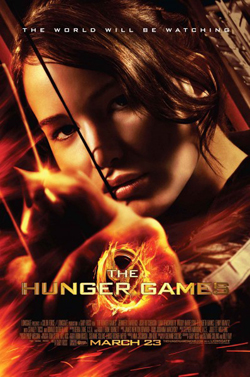The Hunger Games ***
 Forget 2012; finally, the games have arrived. Author Suzanne Collins’s post-apocalyptic world is projected for all to watch on the big screen. The obvious parallels between the existence we are introduced to in The Hunger Games and the possible collision course we are on are eerily not lost – it’s just a shame that the film for the uninitiated book reader results in more questions than satisfying answers. If it weren’t for such a powerful central lead by Winter’s Bone actress Jennifer Lawrence, we probably wouldn’t be half as captivated.
Forget 2012; finally, the games have arrived. Author Suzanne Collins’s post-apocalyptic world is projected for all to watch on the big screen. The obvious parallels between the existence we are introduced to in The Hunger Games and the possible collision course we are on are eerily not lost – it’s just a shame that the film for the uninitiated book reader results in more questions than satisfying answers. If it weren’t for such a powerful central lead by Winter’s Bone actress Jennifer Lawrence, we probably wouldn’t be half as captivated.
North America in a not-to-distant future is gone, and all that remains is Panem, controlled by the elitist, pampered Capitol that forces its surrounding impoverished twelve districts to send a teenage boy and girl – or ‘tribute’ – to compete in the Hunger Games each year. Each tribute is selected as a warped punishment for a past uprising, and must fight to the death until one survivor remains standing. When 16-year-old Katniss’s (Lawrence) younger sister, Prim (Willow Shields), is selected as the mining district’s female representative, Katniss volunteers to take her place. She and her male counterpart Peeta (Josh Hutcherson), will be pitted against bigger, stronger representatives who have trained for this their whole lives.
Like some Dickensian rural backdrop, director Gary Ross captures the glum, desperate living conditions of the District 12 inhabitants, ironically surrounded by nature’s beauty, and keeps the intrigue brewing right up until the Reaping – where the tributes are selected by a ‘lucky’ draw. We are also given a clear overview of how strong a character our heroine is, mainly due to Lawrence’s defiant poise and striking features that Ross could be guilty of over-captialising on throughout, with lots of close-up camerawork. In this sense, he does try to visualise Collins’s word by suggesting this is a Katniss-led story adaptation – plus the author was part of the scriptwriting team.
However, condensing all the psychology and social concepts of the time satisfactorily into a film time frame is where important detail gets lost in translation from page to screen. As functional as the film is in relation to the book, there is not sufficient background into why the tributes seem to accept their fate so readily; how they really feel about competing in an unfair world; plus the significance of the bread, defiant hand signals and Katniss’s nurturing nature toward young Rue (Amandla Stenberg), a fellow tribute and component. Instead, the comparisons to The Twilight Saga lie with Ross’s focus on the potential love interest between Katniss and Peeta. In this respect, Hutcherson is aptly cast opposite Lawrence as the ‘weaker’ Peeta. That said both remain curiously guarded, which is what fuels our intrigue as to any true motive – hopefully to be further explored in a sequel, especially as there are ripples of rebellion in the midst.
To get the 12A rating, a lot of the brutality is portrayed as hurried, choppy close-up sequences, conveniently sanitised to suggest bloodshed, but without triggering the obvious nightmares associated with seeing kids killing kids. Some might argue that making it an 18 would have better served to depict the horrifying reality of surviving in this makeshift world. Whatever the case, you long for a sense of the bigger picture and wider visual setting of the virtual forest that the tributes hunt each other in, in addition to seeing Seneca Crane’s (Wes Bentley) staff designing it from their privileged high tower.
There are other memorable appearances too; Stanley Tucci as purple-coiffured game-show host Caesar Flickerman; Elizabeth Banks as the prissy and eccentric Effie Trinket opposite Woody Harrelson as brash lush Haymitch Abernathy who make up the District 12 tribute training committee. As conscience seems to be non-existent among the Captiol’s residents who treat the Hunger Games as compulsive Saturday night viewing – a frightening acceleration of our reality TV diet, Abernathy is as close to an empathy barometer as is possible. However, even his back-story remains a mystery as such, resulting in the non-read viewer filling in the blanks with possible reasons.
The positives to The Hunger Games are largely thanks to Lawrence in the lead. The rest of the Running Man/Lost-styled film relies heavily on the filmmakers’ falling on the side of ambiguity or stoicism to fuel any mystery, which without any further insight into or challenge to the ‘bigger picture’ only leaves inevitable frustration in its wake and some lagging parts. That said the seed of interest has been sown, and this survival story has more guts (and gore) to it than Twilight could ever wish for, and more winning formula than 2012 can muster, harnessing that gladiatorial fascination that seems inherent to us.
3/5 stars
By @FilmGazer